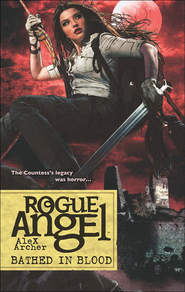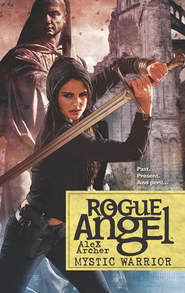По всем вопросам обращайтесь на: info@litportal.ru
(©) 2003-2025.
✖
God Of Thunder
Автор
Год написания книги
2019
Настройки чтения
Размер шрифта
Высота строк
Поля
“ We’ll get it. I need you to meet me. Do you know where Digital Paradise is?”
“Of course I do.”
“Meet me there.”
“When?”
“Now. I’ll be there before you are. Be careful.”
“Why?” Nikolai sounded nervous. “Do you think I’m still in danger?”
“Those guys haven’t got what they came for,” Annja said. “Right now it’s better to be a little paranoid.” She shoved the magazines into her backpack. “I’ll see you there.”
D IGITAL P ARADISE WAS located in the middle of the block. Neon tubes glowed in the windows, announcing the presence of Internet, Games, Sandwiches, Beer and Fun.
Annja purchased time on a card, then retreated to the back of the large room where she could keep an eye on the door. She took a seat in the ergonomic chair, flexed her fingers and started typing.
All around her, players sat at banks of computers, playing video games around the world. Most of them were guys in their teens and early twenties, but there were a few women and older people, as well.
Negotiating the Digital Paradise interface, Annja opened her e-mail in one window and let it start cycling through, thinking there was a chance Mario had sent her an e-mail after everything that had happened.
She also accessed her e-mail at Chasing History’s Monsters, thinking that if Mario had tried contacting her through her answering service there he might also have used the show’s e-mail address.
Normally she didn’t get the mail from the television show. She’d discovered early on that it was as bad as the phone calls were proving to be. The cell phone vibrated from time to time, diverting her attention and causing no end of frustration.
A quick check through alt.archaeology and alt.archaeology.esoterica sites showed a few promising developments on stories she was planning to do, but nothing that pertained to Mario Fellini.
She Googled a page that dealt with international phone numbers and searched for the 371 listing. She learned 371 belonged to Latvia, one of the Eastern European Baltic countries that had broken away from Russia in the 1990s.
A quick, cursory search on Latvia revealed a history replete with Vikings, amber, German crusaders and world trade. The Hanseatic League, the first trade union made up of merchantmen instead of nobility, included Latvia. From beginning to end, the Latvian people had been subjected to a long string of invasions. World War I had left permanent scars on the country, then the Russians had crushed continued efforts for the country to become independent.
It was all interesting. Annja had read into the history somewhat, particularly fascinated by the formation of the Hanseatic League in the fourteenth century, which had opened the floodgates on international commerce.
In its own way, the Hanseatic League had been as world changing as the Internet. For the first time, the middle class was free to trade, invest and speculate in goods that would be imported and exported.
Before that, royalty had controlled those shipments, only allowing what they saw fit to be bought or sold. Vikings had taken ships with ease. By banding together, the merchants spread their shipments over more than one vessel and provided adequate protection in the form of mercenaries.
But whom did Mario know in Latvia? That was the question.
Annja pursued it.
M ARIO KEPT a home page.
Annja found it easily enough after a quick search. She stared at Mario’s picture. If it was recent, he hadn’t changed much.
He was a handsome man, lean and fit. His coloration was Mediterranean, and his hair was black and crept down past his neckline. The scar he’d gotten over his left eye while they’d worked at the Hadrian’s Wall dig was still visible.
Annja smiled at that, remembering how they’d been involved in a bar fight in Haltwhistle.
A local had been selling “genuine” Roman artifacts he’d claimed to have found at Hadrian’s Wall. Mario, with maybe a beer or two too many, had taken umbrage with the man and challenged the authenticity of the artifacts.
The man had come up swinging. Mario wasn’t trained in self-defense, though, and had gotten the worst of it. Annja had stepped in and made short work of the guy and two of his friends with her martial-arts skills.
At the time, it had been scary, but even then something had seemed to come alive in Annja. Okay, so even before you got the sword you sometimes walked on the wild side, she reminded herself.
Annja read through information, learning that Mario had left his position in Vatican City fourteen months earlier. She hadn’t even known he’d worked there.
It made her sad to think that such a prestigious thing had happened to someone she considered a friend and she hadn’t even known about it. You’re not much on friends, she chided herself.
She knew it was her own fault. Most people she met tended to slip through her fingers. She let them. Friends were hard to manage because they often wanted more time than she had to give.
In truth, most of the time she didn’t notice the lack of friends because she was busy pursuing new interests that took her out of Brooklyn and away from her home. She loved being able to come and go as she pleased, and liked that she didn’t have many regrets about being gone for weeks and months at a time.
The page didn’t say why Mario had left Vatican City, but Annja suspected it was because he hadn’t been given free rein to choose his own subjects to research. Mario had always been extremely independent.
He was currently employed as a curator at a small museum in Riga, Latvia. Annja couldn’t read the Latvian language. According to Mario’s Web site, the language was also called Lettish. The name of the museum roughly translated into Peering Through Time and was funded by an independent financial source.
None of that explained what Mario was doing in New York, what he’d sent to her or why someone would be chasing after it.
Nor was there any mention of Erene Skujans.
Annja felt frustrated. Deciding to let that line of inquiry rest for a moment, she turned her attention to the two names she’d gotten from the desk clerk at the Sentry Continental Hotel.
She had more luck finding out who Dieter Humbrecht and Klaus Kaufmann were. But that led to even more questions and confusion.
Her research had turned up three articles with Humbrecht’s name in them, and two of them mentioned Kaufmann. The first was a news article out of South Africa a few years earlier that listed the men as mercenaries. The second was on the Web site of a man whose personal museum collection had been stolen. The third mention was of an arrest of Humbrecht for attempting to break into an archive in Vatican City. He’d received jail time for his efforts.
Annja looked at the notes she’d taken. The break-in attempt had occurred while Mario was employed at Vatican City. Shortly after that, Mario had left.
The timing bothered Annja and made her suspicious. She’d always liked Mario and would never have thought badly of him. But Mario always did like going after the story, she reminded herself. His curiosity drove him. That, and the desire to become famous for a find that would be recognized throughout the world.
Would a find that promised something that big be enough temptation to make Mario cross the line? Annja didn’t know.
At that moment, Nikolai entered the café. The problem was, he hadn’t come alone.
8
Dieter Humbrecht and one of the other men flanked Nikolai. Looking despondent and afraid, Nikolai glanced around the cybercafe, then locked eyes with Annja.
The two men spotted her, too. Humbrecht shoved Nikolai forward, causing him to stumble. A few of the gamers noticed the action and swapped anxious looks. One of them reached for a cell phone.
Okay, Annja told herself, this is going to have to happen fast because the police are going to be involved soon.
She pushed her things into the backpack and zipped it closed. Then she stood and walked toward the men.
Up close, Annja had to admit that Dieter was a handsome man. Unfortunately, according to the newspaper reports out of South Africa, he was also a killer. He’d been acting to save an employer’s life at the time, though.
“Ah, Ms. Creed,” Humbrecht greeted with an English accent. “We meet at last.”











